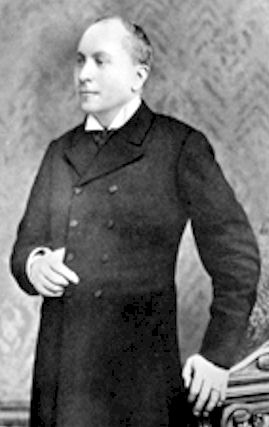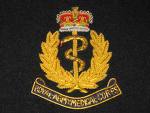 Robert Thomas Cooper (1844 – 14 September 1903) BA, MD, Trinity College Dublin was an Irish orthodox physician who converted to homeopathy, to become a Physician for Diseases of the Ear at the London Homeopathic Hospital, and a member of the British Homeopathic Society from 1869 to 1896.
Robert Thomas Cooper (1844 – 14 September 1903) BA, MD, Trinity College Dublin was an Irish orthodox physician who converted to homeopathy, to become a Physician for Diseases of the Ear at the London Homeopathic Hospital, and a member of the British Homeopathic Society from 1869 to 1896.
Cooper lent his name to the informal meeting group of influential British homeopaths that convened beginning in the 1880s. This was the so called “Cooper Club,” and initially included himself, Thomas Skinner, James Compton Burnett and John Henry Clarke.
Robert Thomas Cooper was born in Cooper’s Hill, Co. Carlow, Ireland, the third son of Reverend Robert Cooper. He graduated AB 1864, LM 1864, MCh MB 1865, MD 1871 and MA 1883, of Trinity College, Dublin.
Shortly after qualifying Cooper served as House Surgeon at the London Homeopathic Hospital and joined the British Homeopathic Society.
In 1866, he “settled in private practice” at 7 Prospect Place in Southampton, before moving to London in 1874. He had two busy London medical practices, at 30A George Street, Hanover Square, and 17 Stanley Gardens, Notting Hill.
In 1870 Cooper married Mary Amelia Beatrice Byng, daughter of Indian Army Major-General John Edmund Byng CB.
While practicing in Southampton in 1870 Cooper ran into opposition from local allopathic physicians who refused to allow him to take up the vacant position at the town Dispensary. This was in spite of him being proposed for the vacancy by a well-regarded local allopathic doctor.
Undeterred, Cooper built a successful private practice in Southampton and later in London where he became a colleague of James John Garth Wilkinson, among others.
Cooper contributed widely to homeopathic publications, and he also wrote on non-medical topics. He published collections of poetry, such as Phil Carca’s Boat, and Other Poems (1893) and Misery and Muddle (1903), as well as works on reforesting, notably Our Empire of Rivers (1886) and Ireland’s Real Grievance (1900). Towards the end of his life forestry became one of his chief concerns and led to Cooper founding and serving as first president of the Irish Forestry Society.
Cooper was a central figure in, and gave his name to, the “Cooper Club” that represented the second main phase of British homeopathy. Four distinguished homeopathic doctors, Cooper, Thomas Skinner, James Compton Burnett and John Henry Clarke, met and dined weekly and shared their notes and experiences over a period roughly from 1880 to 1900. They had a major influence on British homeopathy.
Even after the deaths of Cooper, Compton Burnett and Skinner, the “Cooper Club” continued to meet into the 1930s under John Henry Clarke. Charles Edwin Wheeler and Sir John Weir were also members. It is possible that Edward Bach, James Douglas Kenyon, Percival George Quinton and several others were also members, and taught lay persons, although there is no direct evidence and an air of secrecy shrouds the group.
In the final years of his life Cooper explored new, plant-based therapeutic approaches to cancer that he termed “Arborivital Medicine.” Cooper’s system was not entirely dissimilar from that of Edward Bach of Flower Essence fame.
In the case of Cooper and Edward Bach, the unusual aspect is that they both chose living plant tissue immersed in proof spirit [or spring water] and exposed to sunlight. It is not certain what the justification for this technique was, nor where the idea originally came from. It is not mentioned by Samuel Hahnemann. It is probably more ancient and my guess is that it derives, like most ‘medical nostrums’, from people like Paracelsus.
Cooper’s experiments were applauded by a number of leading British homeopaths. The tremendously influential Margaret Lucy Tyler, wrote that: “Dr. Cooper had an uncanny genius for discovering unusual remedies; some of these he got, no doubt, from old herbals; but it has been said that he used to lie down before a flowering plant by the hour, dragging from it its virtues of healing. He made extraordinary play, in cancer, with some of his flowers, and one heard him called ‘the man who can cure cancer.'” [British Homeopathic Journal, 1932, p.136].
Cooper had been holidaying in Switzerland with his wife and family, when he caught a chill, through “over exertion in tennis,” [Obit, 465] and then contracted influenza that led to “congestion of the lungs,” [Obit, 465].
A notice of his death appeared in the Westminster Gazette of September 19th saying, “his work in Forestry is very well known, he was the founder and first president of the Irish Forestry Society, which came into existence a year or two ago,” [Obit, 466] and that his “knowledge of plant therapeutics being unique,” [Obit, 466].
He regarded vegetation as the “medium for protecting man from calamities of all kinds,” [Obit, 464] and that “the national neglect of forestry was to him a source of the deepest pain.” [Obit, 464]
He was once described as a “member of the ancient cult of Tree Worshippers,” [Obit, 464]. To the ruthless cutting down of forests in past times “Dr Cooper traced much of the agricultural poverty of his native Ireland,” [Obit, 464].
Cooper died two and half years after his close friend and fellow homeopath, James Compton Burnett.
Select Publications:
- Sulphur as a Remedy for Neuralgia and Intermittent Fever (1869)
- Clinical Lectures Upon Inflammation and Other Diseases of the Ear (1878)
- Inflammation Chiefly of the Middle Ear, and Other Diseases of the Ear (1880)
- Otorrhœa-Ear Discharge-and its Treatment (1883)
- Basic Aural Dyscrasia and Vascular Deafness: A New System of Aural Therapeutics and Pathology (1886)
- Cancer and Cancer Symptoms: Chiefly Arborvital Treatment (1900)
Of interest:
 Robert Montagu Le Hunte Cooper M.D. BS LRCP MRCS (30 March 1872 – 1 January 1957), son of Robert Thomas Cooper, was also a homeopath, who also contributed articles to homeopathic publications.
Robert Montagu Le Hunte Cooper M.D. BS LRCP MRCS (30 March 1872 – 1 January 1957), son of Robert Thomas Cooper, was also a homeopath, who also contributed articles to homeopathic publications.
R. M. Le Hunte Cooper was born in Southampton, was a Captain in the Royal Army Medical Corps (1896-1904, 1914) and served in the South African Second Anglo-Boer War during 1901-2.
R. M. Le Hunte Cooper read The Cancer Problem before the International Homeopathic Congress in 1927. He also served as honorary secretary of the Cooper Club.
R. M. Le Hunte Cooper wrote:


Rosamund Le Hunt Cooper was not his wife. She was unmarried until she met Stuart Dodds. Rosamund was a friend of Edward Seago. She is my great aunt.
hi
I have just purchased an oil painting by rosamund some 16 hours ago. the frame is fantastic the painting to my completely untrained eye being very impressionist in style depicting what appears to be very flat terrain possibly grassland with a canal with grass and reed banks. my best guess, as I only ever have been in Norfolk twice and reading a bit about her to very probably be that general part of the country. 15.5 x 19.5″ nice painting. free flowing.
I just read Dr. Cooper’s article on the middle ear in which he talks about ear congestion. He included a little tip: many times, older people develop a layer of dried ear wax right under the eardrum which can cause hearing loss. He cured people of that by putting a couple of drops of glycerin in the ear.
For years, my left ear has seemed like “glue ear” and has annoying tapping noises when I lie down. I took a few homeopathic remedies, such as Kali-mur, but they didn’t help. The only way to stop the tapping so I could get to sleep was to inflate the ear by plugging my nose and blowing. That sometimes improved my hearing but only for a few seconds. So, after reading the article, I put a little glycerin in my left ear then covered it with a small amount of soft tissue (Kleenex, but a cotton ball would work, too). I lied down on my right side so the glycerin would soak in better in the left ear. The next night, I noticed my ear was about 95% better so I plan to continue the drops for however long it takes to cure that last little bit. The ear-tapping noise had been a big problem for many years. So amazing how easy it was to solve, all thanks to Robert Cooper.
Thank you so much, Hahnemann House, for sharing Dr. Cooper’s wisdom with the public!
Thank you for your comment Linda, and how wonderful to know that Cooper is still able to help more than a century after his death! A great physician and homeopath.